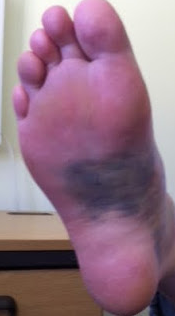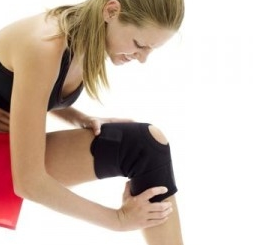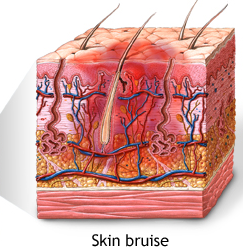Bruised lung is a common consequence of lung injury and is often associated with automobile accidents, falls and blasts. This article will explore various aspects of this condition including symptoms, treatments and the recovery process.
What is a Bruised Lung?
What is a random lung bruise? The term bruised lung is used to refer to a serious medical condition whereby the blood vessels and other tissues in the lungs become injured as a result of chest trauma. Other names with equivalent meaning are pulmonary contusion and lung contusion.

It usually caused by a blunt trauma but it can also occur as a result of explosive injuries. It is therefore not surprising that the term pulmonary contusion gained widespread recognition during world wars I and II when explosives were heavily used.
It was to later get even more recognition (especially among civilians) in the 60s in relation to traffic accidents. Car accidents account for about 70 percent of pulmonary contusions today. Sports injuries, assaults and falls are other common causes of bruised lungs.
A bruised lung occurs when damaged capillaries leak blood another fluids into the lung tissues consequently interfering with gas exchange. When that happens, it often causes insufficient oxygen levels in the body (hypoxia).
This condition is not to be confused with another related condition known as pulmonary laceration which, as the name suggests, involves a tear or cut in lung tissues.
Bruised Lung Symptoms
Bruised lung signs and symptoms include those include those that reflect the lung injury itself to those indicative of other associated injuries and problems e.g. low oxygen levels. Here are some of the common symptoms of unexplained bruises in lungs:

- Chest pain
- Coughing up blood
- Painful or troubled breathing
- Rapid breathing
- High-pitched wheezing when breathing out
- Bluish color in the skin and mucous membranes
- Low tolerance for exercise
- Abnormal crackling sound (heard through a stethoscope) – in more severe cases
- Watery sputum (severe cases)
- Low blood pressure
- Tenderness in the area of chest wall close to the bruise
Most symptoms take time to develop and as such most cases, more than half, presented for treatment are usually asymptomatic. How quickly the symptoms appear depends on the severity of injury. In severe cases, the symptoms may become apparent in as low as 3hours from the time the trauma or random bruise is sustained.
Bruised Lung from Coughing
“I have had a continuous bout of cough for 2 weeks alongside asthma and hay fever and have been treated with a combination of antibiotics and corticosteroids. The cough has since receded and is almost gone but the lung area on the back of the shoulders hurts momentarily. The area also feels tender to touch. Is this an indication that I have bruised lungs?”
From your description, this sounds like a case of musculo-skeletal which essentially means that your muscles in the affected area have been strained by consistent coughing leading to their inflammation and ultimately the pain that you occasionally detect.

It is only a matter of days before the pain from a bruised lung from coughing clears. Just take enough time to rest. If the pain however lingers on for more than a few days after coughing has receded, it would be advisable to see your doctor.
Bruised Lung from a Fall
“I tripped on the stairs at school and now have this chest pain that my friend thinks that it could be the result of bruised lung. How can I ascertain that this is true and what treatment options are best for such a case?” Alex
As we have already mentioned, motor vehicle accidents account for about 70% of all cases of pulmonary contusions but falls, sport injuries and assault also contribute significantly to the overall count of all cases of this condition.
In addition to chest pains, you may experience other symptoms of lung bruising from a fall such as difficulty breathing or rapid breathing, coughingblood, and wheezing among others (see a previous section of this article for more symptoms of lungs bruising from a fall).
Because most of the symptoms appear later on, it would be advisable to get checked by a doctor upon seeing the first symptom(s). She or he will advise on the appropriate treatment regime based on the diagnosis.
Bruised Lung Treatment
The hypoxemia (low oxygen levels in arterial blood) associated with bruised lungs worsen gradually over 24-48 hours since trauma and if untreated, the condition can cause rapid health deterioration or even death within a few days.
The treatment options vary depending on the severity of your injury. These treatments for bruised lungs are aimed at aiding your breathing and ensuring adequate supply of oxygen in your body and include:
Pain relieving medication: These are usually administered to relieve the pain associated with pulmonary contusions and allow easier breathing. The medicine is either given as an intravenous (IV) shot or through small tube in your back (epidural).

Lung exercise:your doctor will also help you to open your air passages using a combination of deep breathing and coughing. This will in turn help to bring up sputum from your lung and speed up the healing process. An incentive spirometer – a device that aids with deeper breaths – may also be used.
Oxygen: Supplemental oxygen may also be given if the patient has difficulty breathing. Face masks and nasal cannulas – a pair of thin, short tubes that are placed inside the nose – are typically used for this purpose.
Suctioning: Any blood or mucus that is blocking the air passages can be removed using an ET (Endotracheal) tube or by inserting thin tube that is attached to a suction machine into your mouth or nasal passages.
Chest tube: This is used to get rid of air and blood trapped around your lungs and heart. It allows your lungs to fill with air as you breathe while maintaining a normal heartbeat. An incision is usually made in your chest to make way for the tube which leads to a container where the drained fluids and blood are collected.
Ventilation: If the patient is having difficulty breathing, a non-invasive positive pressure ventilation machine can be used to pass air in through a plastic mask or a mouthpiece. Unlike the mouthpiece, the mask usually covers both mouth and nose.
Mechanical ventilation may also be used. This entails placing an endotracheal tube into your throat to keep the trachea open and then connecting it to a ventilator to deliver oxygen into the patient.
Bruised Lung Recovery
With proper treatment for bruised lung, it will usually recover in 3to 5 days as long as no secondary infections occur.ARDS is the most common complication associated with pulmonary contusions affecting around 50 percent of all patients suffering from bruised or injured lungs, and 80 percent of patients with pulmonary contusion that affects over 20 percent of their lung.
Pneumonia is also a significant risk in patients with pulmonary contusion as the blood trapped in alveolar spaces provide a suitable culture for bacterial action. Proper pulmonary care is the key to minimizing the risk of pneumonia among people who have sustained the condition.
After discharge, your doctor may give you subsequent appointments to monitor wound healingor recovery of the unexplained bruise on your lung, and assess the development of complications.
Your doctor may also advise you to take some time off work particularly if your work involves lifting and other physical labor aspects. You can also expect to go home with some painkillers to help you reduce pain and promote better breathing sinceshallow breaths can put you at more risk of infections.
It is also advisable to stop smoking as you recover from a lung bruise. Of course it is not an easy action for most people but it is as important as they go.
 eTopical Precious Finds
eTopical Precious Finds


